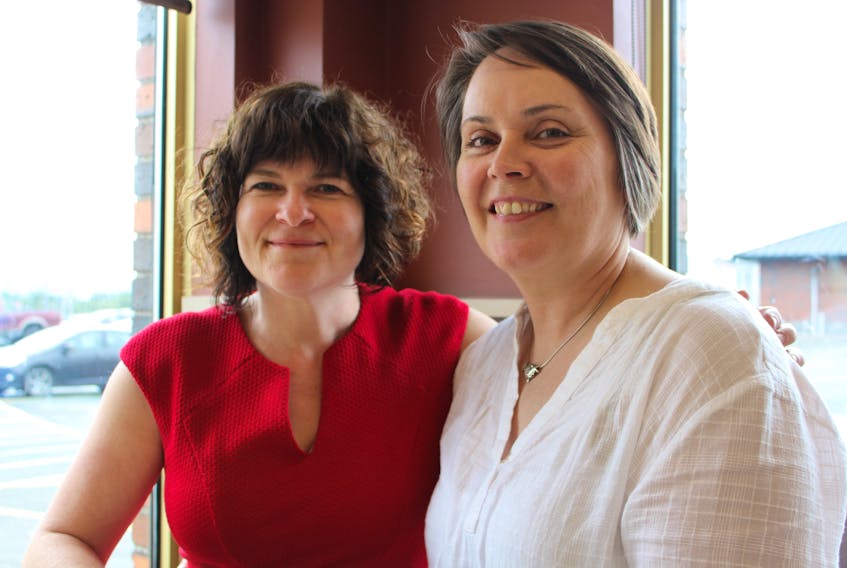The time has come for a difference to be made in the detection and treatment for ovarian cancer.
To do that, exact some change and raise the public’s awareness in what has been dubbed “The Silent Killer,” the Ovarian Cancer Canada organization is hosting its Walk of Hope on Sunday starting at 9 a.m. at Bowring Park in St. John’s.
The walk will help raise funds for Ovarian Cancer Canada, in addition to showing support for women and their families affected by ovarian cancer
The walk begins at 10 a.m. and finishes at 11 a.m. It will be followed by a silent auction, refreshments and snacks, face painting and entertainment. The top fundraisers will be announced for first, second and third place.
Bill Hart of Coast 101.1 FM will emcee the event, which will wrap up at 1 p.m.
In the case of rain, the Bungalow’s patio, which is covered, will be used. Face painting will be held in an assigned tent and the walk will be adjusted to accommodate walkers in the case of inclement weather.
One of the participants will be Vonda Wareham Hayes, a marine biologist with DFO and an ovarian cancer survivor. She received her diagnosis in 2013.
Hayes was no stranger to cancer in her family, as she lost her aunt to the disease. Because of this family history, she was asked to be part of a study that looked at Lynch’s Syndrome, a mutant gene that is passed to offspring by parents.
She had an endometrial biopsy, a test she called a “shot in the dark” at diagnosing ovarian cancer.
“It was found I had an 86 per cent chance of getting cancer. I started getting regular ultrasounds each year and saw a dermatologist,” Hayes said.
“My ovarian cancer got picked up on an ultrasound in 2013. At first they found cysts on my ovary, something many women get as part of their menstrual cycle. They followed it for a few months and then at Christmas 2013 they told me I had cancer.”
She was hoping to have children, so a decision was made to let doctors remove her right ovary and keep her family dreams intact by maintaining her left ovary. But that was a short-lived dream, as two weeks later she was back to have her left ovary removed. She had a full hysterectomy to remove all possible advancements of the cancer.
“When they told me what I had, it was stage 1C which is a very early detection for ovarian cancer,” she said.
“Because of the genetic testing, I had a better chance than most of finding the cancer early. I was devastated when they told me I had cancer, and even though I was disappointed, I was lucky to have a good frame of mind and was living a healthy lifestyle, so that helped me.”
She is now happily 100 per cent cancer-free.
Fast-forward to 2018. Walk chair Marina Whitten’s sister is one of Hayes’ close friends, and she approached Hayes to be a voice for the disease, as she is the only person she knew who had survived ovarian cancer.
“She asked me to be a spokesperson and of course I said by all means. I didn’t know why I wasn’t involved sooner.”
She said raising awareness of the disease and what it will take to help eradicate it are her goals.
Hayes said women need to get their annual checkups and tests without exception because the symptoms for ovarian cancer are so subtle they can often be passed over as other women’s issues.
“By the time you get to the doctor, (cancer) may have progressed further than you have wished,” she said.
“It is shocking nothing has changed in the past 50 years. The research aspect needs to be funded in order to find a cure. There are people out there doing great work, but they need money to do that work.”
Lt.-Gov. Judy Foote and a host of dignitaries will attend the event, which will feature entertainment that includes Emma Moore, Spoonful of Sugar (Disney princesses) and musical acts Peter Fewer, The False Myths, Faith Reardon, Cassie Perfect from Cassie Perfect Makeup (face painting) and Rowena Watkins from Central Hoops, who will host hula hooping.
Ovarian cancer starts in the cells of the ovary. A cancerous or malignant tumour is a group of cells that can grow into and destroy nearby tissue.
It can also spread (metastasize) to other parts of the body. Cancerous ovarian tumours are grouped by the type of cells that the cancer starts in.
Whitten has a personal connection to ovarian cancer, as her mother was diagnosed with the disease in August 2013 and lost her battle in September 2014.
In the 1990s, she was twice diagnosed with breast cancer and both times was successfully treated. At first, it was thought she suffered from a gallbladder issue, but that diagnosis was later changed to ovarian cancer, a fact her family quickly learned didn’t have a great outcome.
Since then, Whitten became a board member of Ovarian Cancer Canada and, this year, she is chairing the organizing committee for the walk in St. John’s.
“I was primarily motivated by my mom, Louise. She was a very generous person who loved to help others, and I know she would want us to do what we can to help other women and their families,” Whitten said.
“The purpose of this event is to raise awareness of ovarian cancer, and gain funding and support for the cause. There are 2,800 diagnoses of ovarian cancer in Canada each year and 1,400 of those will die within five years. There has been no change in survivorship over the past 50 years.”
Whitten said more money and research into ovarian cancer has to be done.
“There is no early detection and when most are diagnosed, it has already achieved Stage 4. They call it ‘the silent killer’ because once it is found, it usually is too late,” she said.
“Change comes through research and there has to be more done to find ways of detecting and treating this disease.”
The Ovarian Cancer Canada Walk of Hope is the most powerful event of its kind in the country.
Organized in more than 35 communities nationwide, the walk directs all attention and funds to overcoming the most fatal cancer to affect women.
Since 2002, the walk has raised more than $25 million. All proceeds from the walk are used to provide support, increase awareness and fund vital research.
To register or donate, visit ovariancancerwalkofhope.ca.
Ovarian cancer facts
Ovarian Cancer Canada is the only national charity dedicated solely to overcoming this disease.
Ovarian Cancer Canada is ensuring that women with ovarian cancer live fuller, better, longer lives by providing support, increasing awareness and funding vital research.
The following facts outline the disease and need for changes to the system that detects and treats ovarian cancer:
• Ovarian cancer is the most fatal cancer to affect women in Canada.
• Five Canadian women are lost to the disease every day.
• 2,800 Canadian women are diagnosed with ovarian cancer each year.
• One out of every two women diagnosed with this disease isn’t expected to live another five years.
• Survival rates for women with ovarian cancer have not improved in 50 years.
• While all women are at risk for developing the disease, a woman is at higher risk if she is over 50 years of age; if her family has a history of certain types of cancer (ovarian, breast, endometrial, colorectal); if she is of Ashkenazi Jewish descent; if she has a genetic mutation associated with ovarian cancer.
Women concerned about their risk for ovarian cancer should speak with their doctor.
Common symptoms of ovarian cancer include bloating, difficulty eating, abdominal discomfort and a change in urinary habits. Women should speak to their doctor if they notice new symptoms that persist for three weeks or longer.









